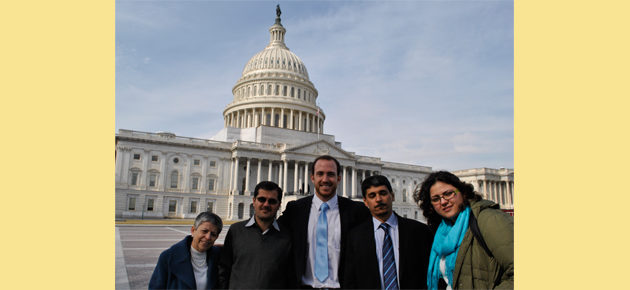Interview Gertrude Bell Documentary: ‘She Would be Unhappy with Iraq Today’
Victorian-era explorer Gertrude Bell contributed much to the making of what is now modern Iraq. And now Western popular culture has discovered her. A major Hollywood movie is in the making as well as an in-depth documentary. NIQASH spoke to the directors of the documentary, Letters from Baghdad, to ask them whether Bell – and colonial history – is at least partially responsible for the state modern Iraqi is in.


Niqash | Berlin
“Ah, Madame Bell”. That is what you are most likely to hear when you ask your Arab friends whether they know who Victorian-era British explorer, Gertrude Bell, was. And despite the fact that historians and the people of the Middle East have known her name for years, Bell is only just becoming a hot topic in the West. A product of Victorian England, Bell, who died in 1926, was “as responsible as anybody for the rickety national state first known as Mesopotamia, and now as Iraq,” British newspaper, The Guardian, reported. “As a powerful official of the British administration in Baghdad after the First World War, Bell ensured that an Arab state was founded from the three Ottoman provinces of Mosul, Baghdad and Basra, but one which was too weak to be independent of Britain.”
US magazine The Atlantic says Bell, who also had archaeology, mountaineering and fluent Arabic among her talents, “mapped Arabia, and midwifed the modern Middle East”.
Additionally Bell was well known because she never dressed up in local clothing, as other explorers like T.E. Lawrence, also known as Lawrence of Arabia, did.
“She seemed to move as an equal among the sheikhs without compromising her British femininity,” the Guardian noted.
And now Bell is to be the subject of a major Hollywood movie, Queen of the Desert, starring Nicole Kidman, Robert Pattinson and James Franco among others, and directed by Werner Herzog. That film is still in production, slated for release in 2015. Rumour also has it that US block buster director, Ridley Scott, was also planning a Gertrude Bell movie, but his would star Angelina Jolie.
A lot more under-the-radar, but perhaps the most interesting of all the Bell projects, is the planned documentary, Letters from Baghdad. The project, based on the trove of letters that Bell wrote and the many pictures she took, is currently in production and is being made by Between the Rivers Productions, with US-based independent film makers, Zeva Oelbaum and Sabine Krayenbühl.
NIQASH spoke to the two film makers about Gertrude Bell’s current popularity, whether the work she did may have set up the framework for conflicts that have plagued Iraq for decades and what she might think of the state of Iraq today.
NIQASH: What kinds of reactions have you had to the fact that you’re making a documentary about Gertrude Bell?
Zeva Oelbaum: It runs the gamut really. She really is quite fondly remembered by many Iraqis – but the ones who remember fondly tend to be Sunnis. So we don’t know if everybody feels the same.
And we have also heard people say she was part of the problem because she represented the government at the time. However almost everyone agrees that she really believed in, and respected, the Iraqi people, that she had an authentic understanding of them and that she truly meant well – something that was in contrast to her male colleagues.
NIQASH: So after all your research, would you say she really was as much of a legend as she is reputed to be?
Sabine Krayenbühl: She spoke Arabic. She was also very strong. She believed it was important to meet people from different cultures on equal terms. She actually wrote that in one of her letters: “don’t try to become one of them”.
She said: “You will find in the East habits of intercourse less fettered by artificial chains and a wider tolerance born of greater diversity. A man may go in public veiled up to the eyes, or clad if he please only in a girdle: he will excite no remark. Why should he? Like everyone else he is merely obeying his own law. So too the European… will be wiser if he does not seek to ingratiate himself with Orientals by trying to ape their habits, unless he is so skilful that he can pass as one off themselves. Let him treat the law of others respectfully, but he himself will meet with a far greater respect if he adheres strictly to his own. For a woman this rule is of the first importance, since a woman can never disguise herself effectually.”
She never tried to dress up like an Arab. That’s part of the reason they respected her and that is how she respected them.
Oelbaum: With her hats and her corsets, she was the only female explorer of that age who didn’t adapt her dress to Arab style.
NIQASH: What do you think Bell would think of the Iraq of today?
Krayenbühl: I think she would be unhappy with the way things had turned out. Her intentions were always about creating an inclusive kind of country, where everybody would get along – although I think in the long run she realised that was unlikely to happen.
Oelbaum: In the original Cabinet she helped form, she was careful to try and bring along representatives of all of Iraq’s ethnic groups. So, although in many ways [modern Iraq] is very far from anything she could relate to – I also think it would be so exasperating for her. The policies that she enacted – that Great Britain enacted – intensified the sectarianism in Iraq – so that would be a familiar problem to her.
NIQASH: Some might argue that some of modern Iraq’s problems can be traced right back to Bell’s time. As the so-called “mid-wife to the modern Middle East”, can she be blamed for some of Iraq’s current problems?
Oelbaum: We are far from experts but one of our advisers, Charles Tripp, who has written a very important book on Iraq, made an insightful comparison between the British and US invasions of Iraq. He said that when the British went into Iraq they preferred to deal with the wealthy, land-owning segment of the population – and that these were mostly Sunnis. That was despite the fact that they had organised an administration that supposedly represented all Iraqis. And the US did a similar thing.
Krayenbühl: So there are similarities; when a foreign power comes in, they often show favouritism [to one sector of the population] and favouritism creates competition.
NIQASH: Are there many Iraqis involved in the project?
Krayenbühl: We have a great collaborator in Saad Eskander, the director of the Iraqi National Library and Archives. But we are very interested in working with other Iraqis too. We are going to interview historians with a connection to that time but we are also looking for Iraqis who have a personal connection to that time, maybe with memorabilia or photographs or even personal accounts, stories they heard from their grandparents, for instance.
It’s really important to us that the Iraqi point of view is represented.
NIQASH: Do you think Gertrude Bell’s brand of diplomacy or her advice would be any good to Iraq today?
Oelbaum: Yes. Actually we ran across one American general who was a big fan. He felt that she had really understood the tribes in Iraq, in a way that was overlooked by the Americans earlier this century.
Krayenbühl: She was very good at getting into other people’s skin. You can really see that in her photography – it was very different from most of the Victorian era photography, which took a very anthropological approach. She was trying to establish a relationship with her pictures. That kind of emotional intelligence would be a great asset for any foreigner working in Iraq today.
NIQASH: Are you at all worried about the upcoming fictional movies that are going to depict Bell, and possibly in an unrealistic way?
Oelbaum: We love Werner Herzog. And we think the two projects could be very complementary.
NIQASH: What do you hope audiences will get from your documentary?
Krayenbühl: We’re devoted to the idea that the documentary will give people a really thorough understanding both of Gertrude Bell – a complex woman in a position of enormous power – and where her journey took her, and also of the very complex history of modern Iraq, and the role she played in that, as well as what her experiences can tell us today.
Oelbaum: The film also deals with the idea of intervention by Western countries, with imperialist ideas, and with problems with the whole idea of nation building. That’s what Great Britain was doing back then. And that is something that should also be being discussed in the contemporary USA. So we would like the film to get people thinking about those parallels. They are significant and we would like to open that discussion up a little more.
*The documentary’s producers would like to hear from any Iraqis who have contributions – stories, memories, pictures, memorabilia – they could make to the film. Contact them here: info@lettersfrombaghdad.com
*The documentary, Letters to Baghdad, is still looking for funding. To donate to the movie please go to their Kickstarter campaign: https://www.kickstarter.com/projects/lettersfrombaghdad/letters-from-baghdad-a-film-about-gertrude-bell




